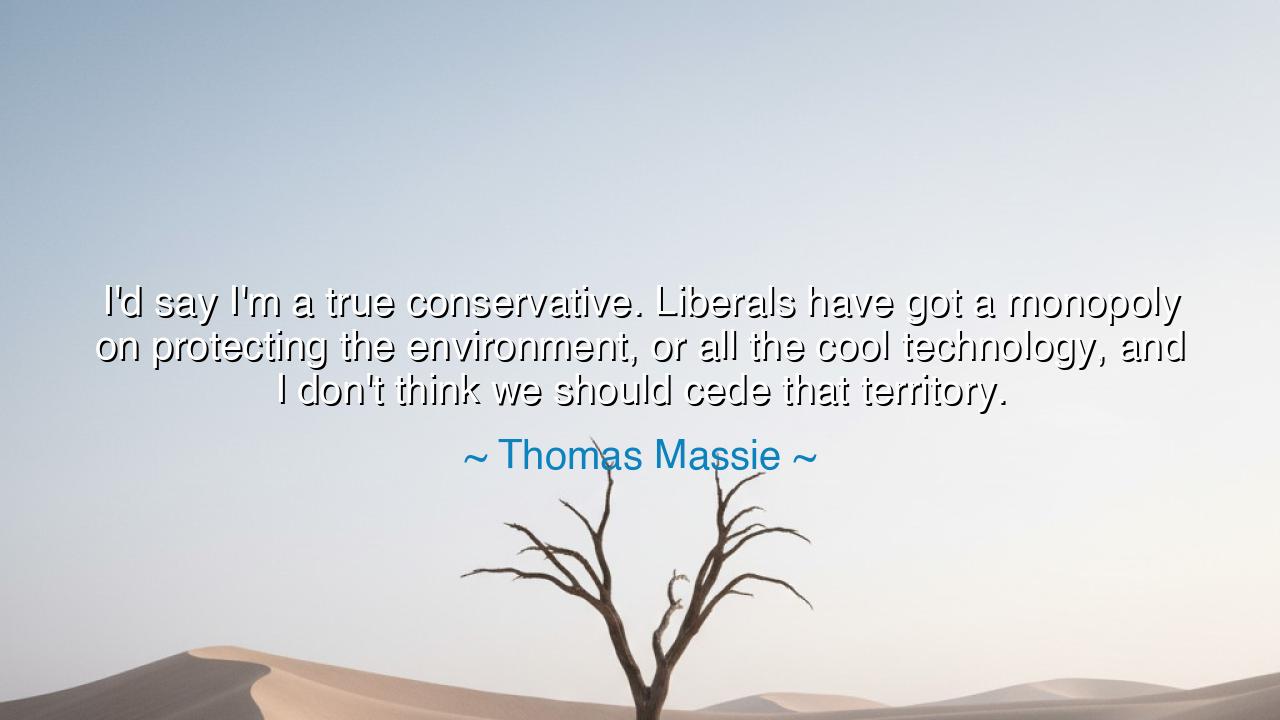
I'd say I'm a true conservative. Liberals have got a monopoly on
I'd say I'm a true conservative. Liberals have got a monopoly on protecting the environment, or all the cool technology, and I don't think we should cede that territory.






In the realm of political discourse, where ideas and ideologies clash like ancient warriors on the field of battle, there are moments when a voice arises, calling for balance and assertion. Thomas Massie speaks with a profound clarity when he declares, “I’d say I’m a true conservative. Liberals have got a monopoly on protecting the environment, or all the cool technology, and I don’t think we should cede that territory.” These words carry the weight of challenge—a challenge to the notion that certain issues, such as environmental protection and technological advancement, are the exclusive domain of any one group. Massie calls upon conservatives to step forward and take their place in these critical arenas, not as passive observers but as active participants in shaping the future.
The ancient philosophers, particularly those from the Greek tradition, understood the importance of balance in governance. Aristotle, in his search for the best life, believed that virtue and wisdom came not from extremes but from a harmonious blending of opposites. He spoke of the need for a moderate approach to life, where both intellect and action worked together toward the greater good of the state and the people. Massie’s words echo this ancient wisdom—recognizing that conservatives should not retreat from the environmental and technological challenges of our time, but instead, step forward to shape these realms with the same vigor and wisdom they bring to other aspects of society.
Conservatism, in its most ancient and noble sense, has always been about preserving the wisdom of the past while ensuring that society evolves with prudence and foresight. Yet, in the modern era, conservatives have often been seen as resistant to change, clinging to the old ways as though they are the only ones who hold the key to a stable future. However, in truth, conservatism is not about rejecting progress but about ensuring that progress aligns with the values that promote human flourishing and the long-term health of both the individual and the collective. Massie’s challenge is a call for conservatives to engage with the very issues that shape the future: the environment, technology, and the shaping of a society that remains true to its foundational principles while adapting to the needs of a changing world.
Consider the example of Theodore Roosevelt, a man widely regarded as a conservative champion of environmental preservation. Roosevelt, during his presidency, enacted policies that protected vast swaths of land, creating national parks and monuments that would preserve the natural beauty of the United States for generations to come. Though a man deeply committed to traditional values, Roosevelt saw the need to balance the preservation of the natural world with the progress of modern industry. His belief was that conservatives should not shy away from engaging in environmentalism, but rather, they should lead the charge in ensuring that nature is protected alongside human progress. Massie’s words reflect this same spirit—urging conservatives to reclaim the mantle of environmental stewardship, a role often seen as belonging solely to the liberal factions.
The same principle applies to the realm of technology, which has often been viewed as the domain of the progressive left. Yet, conservative thinkers like Edmund Burke, the father of modern conservatism, believed in the power of innovation within the framework of tradition. Burke saw that society must evolve, but it must do so with an awareness of its history and roots, ensuring that technological progress does not leave behind the values that sustain society. Massie’s call to embrace technology within a conservative framework is a reflection of this wisdom: the future must be shaped not just by the ideals of one political group, but by the collective wisdom of all, integrating tradition with modernity in a way that benefits everyone.
Massie’s words also remind us that to cede territory in the realms of environmental protection and technological innovation is to weaken the ability of conservatives to shape the future. By stepping away from these critical discussions, conservatives risk allowing one ideology to dominate, creating a lopsided future where balance is lost. The lesson here is one of engagement—that no one group should claim a monopoly on progress or innovation. Instead, it is the duty of all to engage, to bring their unique perspectives and strengths to bear on the challenges of the present and the future.
The lesson of Massie’s call to action is not merely political; it is deeply human. It is a reminder that every generation must not only preserve the wisdom of the past but also embrace the challenges and opportunities of the future. Whether in the realm of environmental conservation, technology, or social progress, the task before us is to ensure that no one group holds dominion over the forces that will shape the world to come. Let us take this wisdom into our own lives—recognizing that we must each engage with the issues that define our time, not as passive spectators, but as active participants, seeking balance, justice, and wisdom in all that we do. The future belongs to those who are willing to act, to engage, and to shape it with care and foresight.






AAdministratorAdministrator
Welcome, honored guests. Please leave a comment, we will respond soon